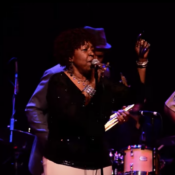In honor of Black History Month, ACTA invited author and scholar Dr. Umi Vaughan to interview one of our 2021 ACTA mentor artists, The Dynamic Miss Faye Carole, about her life and work as a blues musician. In addition to an engaging video interview, the pair put together a playlist of seminal songs that signal different parts of Faye’s musical lineage. Keep scrolling to listen!
As a performer, music scholar, author, fan of jazz, funk, and the blues, I was thrilled when ACTA asked me to lead a recorded conversation with legendary vocalist, performer, and educator, The Dynamic Miss Faye Carol. I’m an Oakland native, steeped in our unique cultural arts scene which is informed by the contributions of migrants from all over the world, but especially the Southern U.S. Miss Faye came as a child from Mississippi and has been beautifying Oakland musically for decades. She participated in ACTA’s 2021 Apprentice Program mentoring bass player James Wiley in the blues tradition, as well as ACTA’s 2021 Living Cultures Grant program with her own School of the Get Down project. She was also recently honored with the prestigious Hewlett 50 Commission in the Folk and Traditional Arts.
In our conversation, Miss Faye discusses these accomplishments, but also explains how she discovered the magic of her singing voice and what keeps her excited about making music. As a way to demonstrate her musical tastes and show the interplay of old and new that defines her style, we put together a playlist inspired in part by the Yoruba people’s number of fulfillment, and in part by American tradition. Sixteen cowries for divination. Sixteen years to mark the passage into womanhood. Sixteen soulful tunes sung by Black women, selected and arranged in order by Miss Faye Carol herself. Listen to our conversation and playlist, and let them move you!
Umi: “After all this time, Miss Faye, what keeps you excited about making music?”
Faye: “Well, I think what keeps me excited about it is because I think I’m lucky enough to have found my lane in life. I just love it, like I always have loved it, and I don’t even know why I love it so much, but I do–that flame never dies for music, ever. And it’s something that I think is not a luxury, but a necessity. It’s a necessity, because we need art to feed our souls, and since music is my lane, I know that its place is to feed people’s soul, and allow you a place to use your emotions. How do you feel? Do you feel like laughing? Do you feel like crying? Do you feel like cussin’ somebody out? Do you want to demand your rights? Or, are you happy because you just got something that you wanted, and you want to tell everybody about it! Did you just fall in love? Or did you fall out of love? You know, all the things that we experience as people – music helps us to relate to one another, and all the things in life that we live, and it also can make us reflect, be quiet, and think.”
Mothership Connection: The Playlist
About the Contributor
Dr. Umi Vaughan is a scholar/artist who conducts research, creates photographs and performances, and publishes work that examines the evolution and meaning of music/dance traditions across the African Diaspora. He holds a Ph.D. in Cultural Anthropology from the University of Michigan and is currently Associate Professor of Africana Studies and director of the Center for Black Student Success at California State University Monterey Bay. Dr. Vaughan is the author of Carlos Aldama’s Life in Batá: Cuba, Diaspora, and the Drum (Indiana University Press) and Rebel Dance, Renegade Stance: Timba Music and Black Identity in Cuba (University of Michigan Press).

 Dr. Umi Vaughan
Dr. Umi Vaughan

